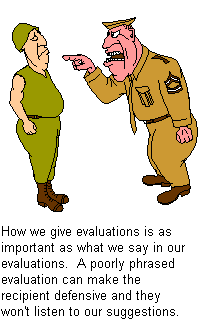
 |
After a recent speech, I collected the comments that had been written. I made humorous overheads to go along with my speech. One person suggested that I don't use the overheads. An other person thought the overheads made the speech. Which one was wrong? Neither one! They both said how the gestures effected them. That is one of the advantages of Toastmasters over a class. You get the opinions of several people instead of the opinion of one teacher.
Some people hesitate to offer their opinion especially when evaluating an experienced speaker. Speakers treasure the opinions of the experienced evaluators and the fresh perspective of newer members. For example, when John Noonan was the President of Toastmasters International, he was the key note speaker at our District's Presidents' Premiere. He asked who in the audience had given a speech but hadn't given an evaluation yet. He chose one woman who had her had up to evaluate his speech.
When I was putting up our fence, my neighbor came over. After looking down the row of posts I had put in, he said, "the third one form the end is out of line. It won't look right. When we put up our fence, they were all right on." My first reaction was why is he telling me what to do. Then, I realized the problem was a poor evaluation. If he had said, "the third post looks a little out of line to me", I probably would have reacted differently.
When you are giving an evaluation, try to use phrases like "I felt ...", "I think ..." or "it effected me this way" instead of "you should".
Except for you attention, you opinion is the most important thing you
can give a speaker. Don't be afraid to tell the speaker you opinion,
and don't be afraid to let the speaker know it your opinion.
When we use "criticism" or "a negative point", the speaker mentally prepares to defend themselves instead of listening to what you have to say. The response to these words can be explained by some other words my thesaurus suggests for criticize: carp, find fault, nag, nit pick and scold. If a speaker is defending themselves they will be less apt to use the evaluation to improve their speech.
We want to provide suggestions not criticisms. When we criticize, we say, "When you did ____, it didn't work very well." When we provide suggestions, we say, "it may work better if you tried to do it this way." The speaker often knows what went wrong. By giving them suggestions, we give them a way to improve.
Evaluations are important tools in our club. By choosing our words carefully and making suggestions instead of criticisms, we can make evaluations more effective.
We want to let the author know how well they covered their topic. Did the author cover enough of the topic? Did the author try to cover too much material? Did the speaker need present enough supporting material?
Was the material appropriate for the audience? If the material is to technical, the audience will be confused. If the material is too basic, the audience will be bored. We often talk about the choice of words being appropriate for the audience, but what about the content?
We need to be very careful when providing feed back as to how appropriate the speech was for the audience's views. When not presented well, I've seen the speaker think the evaluator was attacking their views. We need make it clear that we feel their speech was aimed at an audience that hand similar views.
Speeches to a mixed audience or an audience with different views than our own views have to be presented differently. The speeches "Speeches Under Fire" from Public Relations and "The Adversary Relationship" from Speeches by Management talk about the differences in these types of speeches.
Evaluating the content of a speech can be harder than evaluating the speaking style. However, the content is the reason for the speech and deserves our feedback.
You are leading the evaluation section, so go up to the lectern and take control. Once you have control, you can introduce the other evaluators, the timer and ah counter. (You did check to be sure the evaluators would be at the meeting ... didn't you?) You, also, need to evaluate the meeting, the toastmaster and the other evaluators.
An evaluation is an impromptu speech. Several questions you can discuss when evaluating that speech are: How was the balance between the speaker's weak and strong point balanced? Were there suggestions for the weak points? How well did the evaluation cover the speaker's objectives? Did the evaluation have an opening, body and conclusion? How was the evaluators speaking style?
Being toastmaster is a big a job as being a speaker. You need to provide feed back for the toastmaster. Several questions you can discuss when evaluating the toastmaster are: Did the toastmaster start the applause and greet the speaker at the lectern? Did the toastmaster highlight the speakers' backgrounds that related to their speeches? Did the toastmaster convey too much information about the subject of the speech? Did the toastmaster set the mood for the speeches?
Evaluating the overall flow of the meeting. This is the "everything else" part of your evaluation. How were the opening of the meeting? How was table topics? How were are guests treated? What could have been do differently so you would have gotten more from the meeting?
You broke the general evaluation task into several smaller tasks, and you got though it. Actually, it went quite well. Like after your ice breaker, you are ready to try it again with a new confidence. And, next time, you won't be quite so nervous.
 Rick's Toastmaster skills page http://www.oocities.org/Athens/Acropolis/3558/Achiever.htm
Rick's Toastmaster skills page http://www.oocities.org/Athens/Acropolis/3558/Achiever.htm
![]() Rick's home page http://www.oocities.org/Athens/Acropolis/3558
Rick's home page http://www.oocities.org/Athens/Acropolis/3558
Last Updated: